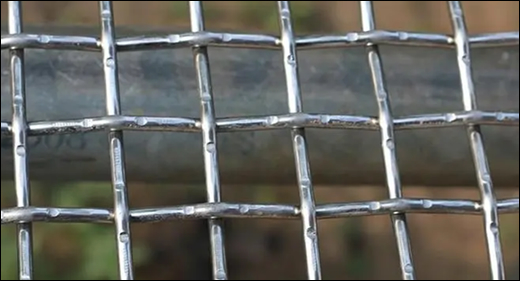Stainless Steel Wire Mesh Screen, Crimped: Stainless Steel Wire Mesh Screen, Crimped has a distinctive crimped weave that provides additional strength and stability. This design is beneficial for applications requiring a sturdy mesh that can maintain its shape under load. It is commonly used in mining, quarrying, and architectural applications for its enhanced durability.
Crimped wire mesh is a type of woven wire mesh made from various materials like stainless steel, galvanized steel, or other alloys. The key difference lies in the pre-crimping process, where the wires are bent before weaving. This creates a stronger lock between the wires, resulting in a more stable and durable mesh compared to flat woven options. Crimping strengthens the mesh against pulling, tearing, and fraying. Stainless steel offers superior corrosion resistance, making it ideal for marine environments, while galvanized steel provides a cost-effective option for general use. This versatility makes crimped wire mesh suitable for a variety of industrial, commercial, and even decorative applications.
Material Options: Durability at Your Fingertips
- Stainless Steel 304: The go-to choice for its exceptional resistance to corrosion and wear-and-tear.
- Stainless Steel 316: Provides superior corrosion resistance, particularly against harsh chemicals and salt environments.
- Galvanized Steel: Offers a cost-effective solution with good rust protection due to the zinc coating.
- Carbon Steel: Favored for its strength and affordability, making it ideal for heavy-duty applications.
- Brass and Copper: Utilized for specific applications where non-magnetic properties and conductivity are crucial.

Mesh Count: Balancing Visibility and Protection
- 2 Mesh: A coarse mesh with large openings, ideal for applications where airflow or light transmission is prioritized over particle filtration.
- 4 Mesh: Frequently used in industrial settings for applications like sifting or sorting larger particles.
- 10 Mesh: Provides a medium-sized opening, striking a balance between clear visibility and adequate protection from smaller particles.
- 20 Mesh: A finer mesh suitable for filtering moderately sized particles in applications like dust control or liquid filtration.
- 50 Mesh: An extremely fine mesh for intricate filtering tasks, such as sieving very fine powders or filtering microscopic particles.
Wire Diameter: Finding the Right Strength
Wire diameter is a critical factor impacting the mesh's strength and flexibility.
- 0.020 inches (0.508 mm) / 24 BWG: A thin wire used for fine mesh screens, prioritizing flexibility over structural strength.
- 0.035 inches (0.889 mm) / 20 BWG: A medium wire offering a good balance between strength and flexibility for versatile applications.
- 0.047 inches (1.19 mm) / 18 BWG: The most widely used wire size, suitable for a broad range of applications.
- 0.080 inches (2.03 mm) / 14 BWG: A thick wire for heavy-duty meshes requiring enhanced structural integrity.
- 0.135 inches (3.43 mm) / 10 BWG: An extra thick wire ideal for applications demanding exceptional strength.
Standard Shapes: Selecting the Optimal Form
Crimped wire mesh comes in various shapes to suit specific needs:
- Square: The most popular shape, offering a general-purpose solution for most applications.
- Rectangular: Employed in situations where a specific width-to-length ratio is required.
- Diamond: Often tercih [preferred] for decorative purposes due to its visually appealing aesthetic.
Available Sizes: Matching Your Project Requirements
Crimped wire mesh comes in standard sheet and roll sizes to cater to projects of varying scales:
- 3 feet x 10 feet (914.4 mm x 3048 mm): A popular size for larger projects requiring significant coverage.
- 4 feet x 8 feet (1219.2 mm x 2438.4 mm): A standard size prevalent in industrial settings.
- 6 feet x 12 feet (1828.8 mm x 3657.6 mm): Utilized for applications demanding extensive coverage areas.
- Rolls of 3 feet (914.4 mm) in width and 100 feet (30480 mm) in length: Ideal for continuous applications requiring long stretches of mesh.



